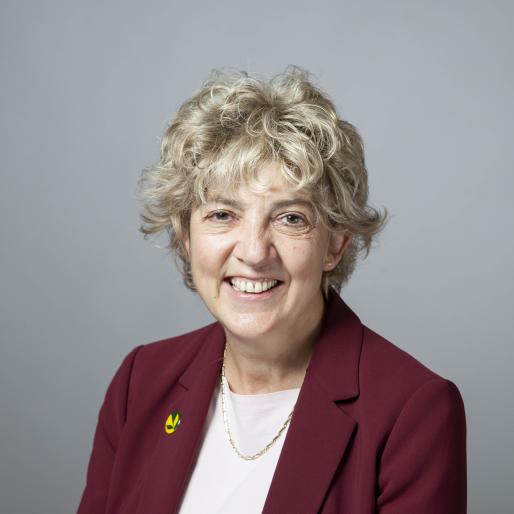The big picture: using wildflower strips for pest control
Every five years, Rothamsted Research develops a revised science strategy, in order to deliver the knowledge and innovation required to address grand challenges faced by farmers and society for food production and environmental sustainability. Rothamsted Research is a Biotechnology and Biological Sciences Research Council (BBSRC) strategically supported institute and investment by the BBSRC in Rothamsted’s science strategy, follows a robust, independent and international peer review process.
Rothamsted’s 2017-2022 science strategy is comprised of five multidisciplinary, interdependent programmes that are collaborative within the institute, funded from multiple sources, and in some cases, across institutes and other organisational research programmes. At Rothamsted, this research addresses challenges from the molecular to the landscape level focusing on arable and livestock farming systems. The 2017-2022 institute strategic programmes are:
Research to deliver on the aims of the above five institute strategic programmes is further supported by three National Capabilities at Rothamsted Research: a) the Long-term Experiments and the associated electronic Rothamsted archive (e-RA), b) the Rothamsted Insect Survey (RIS) and c) the North-Wyke Farm Platform.
A strategic approach to Knowledge Exchange and Commercialization of research (KEC) is an integral component of the Rothamsted Research 2017-2022 science strategy, to ensure the effective dissemination of knowledge, and accelerate the delivery of innovation to farmers both nationally and internationally, and ultimately enable the realisation of the bio-based economy.
The BBSRC’s new investment of £50.9M will constitute the majority contribution to the delivery of the scientific research portfolio and KEC programme at Rothamsted Research, through their co-funding of ASSIST (together with NERC) and through major support of the first three programmes and the institutes’ national capabilities. The funding is confirmed until the end of 2020 and then indicative for two years, depending on BBSRC’s future allocations.
“BBSRC’s strategic funding investments in research, people and vital national capabilities at world leading bioscience institutes will deliver new knowledge and innovation and help realise the potential of a bio-based economy,” said Professor Melanie Welham, BBSRC Chief Executive. “The positive impacts in food, agriculture, energy, materials and health will help drive economic growth and deliver benefits to society across the UK and beyond.”
Professor Achim Dobermann, Director and Chief Executive at Rothamsted Research commented: “We are delighted to have the long-term commitment and support by the BBSRC for the delivery of research objectives aiming to offer solutions for agriculture in some of the most challenging issues”
“This investment represents a substantive total percentage of our budget requirements. The remaining percentage is raised through competitive grants from other established funding authorities and it is a demonstration of the excellent work carried out by the world-class researchers and support staff, whom I am privileged to work with”, Achim Dobermann added.
The new strategy for 2023-2028 is currently in preparation.

DIRECTOR & CHIEF EXECUTIVE
Rothamsted Research is the longest-running agricultural research institute in the world. We work from gene to field with a proud history of ground-breaking
discoveries in areas as diverse as crop management, statistical interpretation and soil health. Our founders, in 1843, were the pioneers of modern
agriculture, and we are known for our imaginative science and our collaborative approach to developing innovative farm practice.
Through independent research, we make significant contributions to improving agri-food systems in the UK and internationally, with
economic impact estimated to exceed £3 bn in annual contribution to the UK economy. Our strength lies in our systems approach, which combines strategic research,
interdisciplinary teams and multiple partnerships.
Rothamsted is home to three unique National Bioscience Research Infrastructures which are open to researchers from all over the world:
The Long-Term Experiments,
Rothamsted Insect Survey and the
North Wyke Farm Platform.
We are strategically funded by the Biotechnology and Biological Sciences Research Council (BBSRC), with additional support from other national and
international funding streams, and from industry. We are also supported by the Lawes Agricultural Trust (LAT).
The Biotechnology and Biological Sciences Research Council is part of UK Research and Innovation, a non-departmental public body funded by a grant-in-aid
from the UK government.
BBSRC invests to push back the frontiers of biology and deliver a healthy, prosperous and sustainable future. Through our investments, we build and support a vibrant,
dynamic and inclusive community which delivers ground-breaking discoveries and develops bio-based solutions that contribute to tackling global challenges,
such as sustainable food production, climate change, and healthy ageing.
As part of UK Research and Innovation (UKRI), we not only play a pivotal role in fostering connections that enable the UK’s world-class research and innovation system
to flourish – we also have a responsibility to enable the creation of a research culture that is diverse, resilient, and engaged.
BBSRC proudly forges interdisciplinary collaborations where excellent bioscience has a fundamental role. We pioneer approaches that enhance the equality, diversity,
and inclusion of talent by investing in people, infrastructure, technologies, and partnerships on a global scale.
The Lawes Agricultural Trust, established in 1889 by Sir John Bennet Lawes, supports Rothamsted Research’s national and international agricultural science through the provision of land, facilities and funding. LAT, a charitable trust, owns the estates at Harpenden and Broom's Barn, including many of the buildings used by Rothamsted Research. LAT provides an annual research grant to the Director, accommodation for nearly 200 people, and support for fellowships for young scientists from developing countries. LAT also makes capital grants to help modernise facilities at Rothamsted, or invests in new buildings.